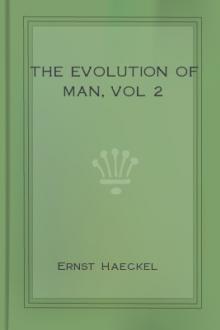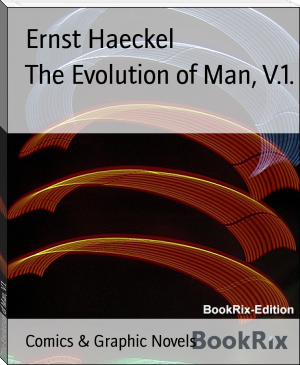author - "Ernst Haeckel"

I do not know, but it must be bad indeed if it inculcates more falsities than are at present foisted upon the young in the name of the Church.
I make these remarks simply in the interests of fair play. Far be it from me to suggest that it is desirable that the inculcation of the doctrine of evolution should be made a prominent feature of general education. I agree with Professor Virchow so far, but for very different reasons. It is not that I think the evidence of that doctrine insufficient, but that I doubt whether it is the business of a teacher to plunge the young mind into difficult problems concerning the origin of the existing condition of things. I am disposed to think that the brief period of school-life would be better spent in obtaining an acquaintance with nature, as it is; in fact, in laying a firm foundation for the further knowledge Which is needed for the critical examination of the dogmas, whether scientific or anti-scientific, which are presented to the adult mind. At present, educati

plete idea of the past development ofman's ancestors within the vertebrate stem by putting together andcomparing the embryological developments of the various groups ofvertebrates. And when we go below the lowest vertebrates and comparetheir embryology with that of their invertebrate relatives, we canfollow the genealogical tree of our animal ancestors much farther,down to the very lowest groups of animals.
In entering the obscure paths of this phylogenetic labyrinth, clingingto the Ariadne-thread of the biogenetic law and guided by the light ofcomparative anatomy, we will first, in accordance with the methods wehave adopted, discover and arrange those fragments from the manifoldembryonic developments of very different animals from which thestem-history of man can be composed. I would call attentionparticularly to the fact that we can employ this method with the sameconfidence and right as the geologist. No geologist has ever hadocular proof that the vast rocks that compose our Carboniferous

years ago, a distinguishedbiologist wrote in the Frankfurter Zeitung that it would secureimmortality for its author, the most notable critic of the idea ofimmortality. And the Daily Telegraph reviewer described the Englishversion as a "handsome edition of Haeckel's monumental work," and "anissue worthy of the subject and the author."
The influence of such a work, one of the most constructive thatHaeckel has ever written, should extend to more than the few hundredreaders who are able to purchase the expensive volumes of the originalissue. Few pages in the story of science are more arresting andgenerally instructive than this great picture of "mankind in themaking." The horizon of the mind is healthily expanded as we followthe search-light of science down the vast avenues of past time, andgaze on the uncouth forms that enter into, or illustrate, the line ofour ancestry. And if the imagination recoils from the strange andremote figures that are lit up by our search-light, and hesitates toaccep

Ernst Heinrich Philipp August Haeckel (German: [ˈhɛkəl]; February 16, 1834 – August 9, 1919[1]) was a German biologist, naturalist, philosopher, physician, professor, and artist who discovered, described and named thousands of new species, mapped a genealogical tree relating all life forms, and coined many terms in biology, including anthropogeny, ecology, phylum, phylogeny, stem cell, and the kingdom Protista. Haeckel promoted and popularized Charles Darwin's work in Germany and developed the controversial recapitulation theory ("ontogeny recapitulates phylogeny") claiming that an individual organism's biological development, or ontogeny, parallels and summarizes its species' evolutionary development, or phylogeny.

Ernst Heinrich Philipp August Haeckel (German: [ˈhɛkəl]; February 16, 1834 – August 9, 1919[1]) was a German biologist, naturalist, philosopher, physician, professor, and artist who discovered, described and named thousands of new species, mapped a genealogical tree relating all life forms, and coined many terms in biology, including anthropogeny, ecology, phylum, phylogeny, stem cell, and the kingdom Protista. Haeckel promoted and popularized Charles Darwin's work in Germany and developed the controversial recapitulation theory ("ontogeny recapitulates phylogeny") claiming that an individual organism's biological development, or ontogeny, parallels and summarizes its species' evolutionary development, or phylogeny.
The published artwork of Haeckel includes over 100 detailed, multi-colour illustrations of animals and sea creatures (see: Kunstformen der Natur, "Art Forms of Nature"). As a philosopher, Ernst Haeckel wrote Die Welträtsel (1895–1899, in English, The Riddle of the Universe, 1901), the genesis for the term "world riddle" (Welträtsel); and Freedom in Science and Teaching[2] to support teaching evolution.

Ernst Heinrich Philipp August Haeckel (German: [ˈhɛkəl]; February 16, 1834 – August 9, 1919[1]) was a German biologist, naturalist, philosopher, physician, professor, and artist who discovered, described and named thousands of new species, mapped a genealogical tree relating all life forms, and coined many terms in biology, including anthropogeny, ecology, phylum, phylogeny, stem cell, and the kingdom Protista. Haeckel promoted and popularized Charles Darwin's work in Germany and developed the controversial recapitulation theory ("ontogeny recapitulates phylogeny") claiming that an individual organism's biological development, or ontogeny, parallels and summarizes its species' evolutionary development, or phylogeny.
The published artwork of Haeckel includes over 100 detailed, multi-colour illustrations of animals and sea creatures (see: Kunstformen der Natur, "Art Forms of Nature"). As a philosopher, Ernst Haeckel wrote Die Welträtsel (1895–1899, in English, The Riddle of the Universe, 1901), the genesis for the term "world riddle" (Welträtsel); and Freedom in Science and Teaching[2] to support teaching evolution.

I do not know, but it must be bad indeed if it inculcates more falsities than are at present foisted upon the young in the name of the Church.
I make these remarks simply in the interests of fair play. Far be it from me to suggest that it is desirable that the inculcation of the doctrine of evolution should be made a prominent feature of general education. I agree with Professor Virchow so far, but for very different reasons. It is not that I think the evidence of that doctrine insufficient, but that I doubt whether it is the business of a teacher to plunge the young mind into difficult problems concerning the origin of the existing condition of things. I am disposed to think that the brief period of school-life would be better spent in obtaining an acquaintance with nature, as it is; in fact, in laying a firm foundation for the further knowledge Which is needed for the critical examination of the dogmas, whether scientific or anti-scientific, which are presented to the adult mind. At present, educati

plete idea of the past development ofman's ancestors within the vertebrate stem by putting together andcomparing the embryological developments of the various groups ofvertebrates. And when we go below the lowest vertebrates and comparetheir embryology with that of their invertebrate relatives, we canfollow the genealogical tree of our animal ancestors much farther,down to the very lowest groups of animals.
In entering the obscure paths of this phylogenetic labyrinth, clingingto the Ariadne-thread of the biogenetic law and guided by the light ofcomparative anatomy, we will first, in accordance with the methods wehave adopted, discover and arrange those fragments from the manifoldembryonic developments of very different animals from which thestem-history of man can be composed. I would call attentionparticularly to the fact that we can employ this method with the sameconfidence and right as the geologist. No geologist has ever hadocular proof that the vast rocks that compose our Carboniferous

years ago, a distinguishedbiologist wrote in the Frankfurter Zeitung that it would secureimmortality for its author, the most notable critic of the idea ofimmortality. And the Daily Telegraph reviewer described the Englishversion as a "handsome edition of Haeckel's monumental work," and "anissue worthy of the subject and the author."
The influence of such a work, one of the most constructive thatHaeckel has ever written, should extend to more than the few hundredreaders who are able to purchase the expensive volumes of the originalissue. Few pages in the story of science are more arresting andgenerally instructive than this great picture of "mankind in themaking." The horizon of the mind is healthily expanded as we followthe search-light of science down the vast avenues of past time, andgaze on the uncouth forms that enter into, or illustrate, the line ofour ancestry. And if the imagination recoils from the strange andremote figures that are lit up by our search-light, and hesitates toaccep

Ernst Heinrich Philipp August Haeckel (German: [ˈhɛkəl]; February 16, 1834 – August 9, 1919[1]) was a German biologist, naturalist, philosopher, physician, professor, and artist who discovered, described and named thousands of new species, mapped a genealogical tree relating all life forms, and coined many terms in biology, including anthropogeny, ecology, phylum, phylogeny, stem cell, and the kingdom Protista. Haeckel promoted and popularized Charles Darwin's work in Germany and developed the controversial recapitulation theory ("ontogeny recapitulates phylogeny") claiming that an individual organism's biological development, or ontogeny, parallels and summarizes its species' evolutionary development, or phylogeny.

Ernst Heinrich Philipp August Haeckel (German: [ˈhɛkəl]; February 16, 1834 – August 9, 1919[1]) was a German biologist, naturalist, philosopher, physician, professor, and artist who discovered, described and named thousands of new species, mapped a genealogical tree relating all life forms, and coined many terms in biology, including anthropogeny, ecology, phylum, phylogeny, stem cell, and the kingdom Protista. Haeckel promoted and popularized Charles Darwin's work in Germany and developed the controversial recapitulation theory ("ontogeny recapitulates phylogeny") claiming that an individual organism's biological development, or ontogeny, parallels and summarizes its species' evolutionary development, or phylogeny.
The published artwork of Haeckel includes over 100 detailed, multi-colour illustrations of animals and sea creatures (see: Kunstformen der Natur, "Art Forms of Nature"). As a philosopher, Ernst Haeckel wrote Die Welträtsel (1895–1899, in English, The Riddle of the Universe, 1901), the genesis for the term "world riddle" (Welträtsel); and Freedom in Science and Teaching[2] to support teaching evolution.

Ernst Heinrich Philipp August Haeckel (German: [ˈhɛkəl]; February 16, 1834 – August 9, 1919[1]) was a German biologist, naturalist, philosopher, physician, professor, and artist who discovered, described and named thousands of new species, mapped a genealogical tree relating all life forms, and coined many terms in biology, including anthropogeny, ecology, phylum, phylogeny, stem cell, and the kingdom Protista. Haeckel promoted and popularized Charles Darwin's work in Germany and developed the controversial recapitulation theory ("ontogeny recapitulates phylogeny") claiming that an individual organism's biological development, or ontogeny, parallels and summarizes its species' evolutionary development, or phylogeny.
The published artwork of Haeckel includes over 100 detailed, multi-colour illustrations of animals and sea creatures (see: Kunstformen der Natur, "Art Forms of Nature"). As a philosopher, Ernst Haeckel wrote Die Welträtsel (1895–1899, in English, The Riddle of the Universe, 1901), the genesis for the term "world riddle" (Welträtsel); and Freedom in Science and Teaching[2] to support teaching evolution.